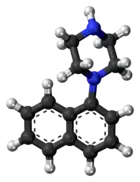 | |
 | |
| Clinical data | |
|---|---|
| Routes of administration | Oral |
| ATC code |
|
| Legal status | |
| Legal status |
|
| Identifiers | |
| |
| CAS Number | |
| PubChem CID | |
| IUPHAR/BPS | |
| ChemSpider | |
| UNII | |
| CompTox Dashboard (EPA) | |
| Chemical and physical data | |
| Formula | C14H16N2 |
| Molar mass | 212.296 g·mol−1 |
| 3D model (JSmol) | |
| |
1-(1-Naphthyl)piperazine (1-NP) is a drug which is a phenylpiperazine derivative. It acts as a non-selective, mixed serotonergic agent, exerting partial agonism at the 5-HT1A, 5-HT1B, 5-HT1D, 5-HT1E, and 5-HT1F receptors,[1][2][3] while antagonizing the 5-HT2A, 5-HT2B, and 5-HT2C receptors.[4][5][6] It has also been shown to possess high affinity for the 5-HT3, 5-HT5A, 5-HT6, and 5-HT7 receptors,[7][8][9][10] and may bind to 5-HT4 and the SERT as well.[11][12] In animals it produces effects including hyperphagia,[13][14][15] hyperactivity,[16][17] and anxiolysis,[17][18][19][20] of which are all likely mediated predominantly or fully by blockade of the 5-HT2C receptor.
See also
References
- ↑ Schoeffter P, Hoyer D (June 1989). "Interaction of arylpiperazines with 5-HT1A, 5-HT1B, 5-HT1C and 5-HT1D receptors: do discriminatory 5-HT1B receptor ligands exist?". Naunyn-Schmiedeberg's Archives of Pharmacology. 339 (6): 675–83. doi:10.1007/bf00168661. PMID 2770889. S2CID 42399446.
- ↑ Bai F, Yin T, Johnstone EM, et al. (January 2004). "Molecular cloning and pharmacological characterization of the guinea pig 5-HT1E receptor". European Journal of Pharmacology. 484 (2–3): 127–39. doi:10.1016/j.ejphar.2003.11.019. PMID 14744596.
- ↑ Adham N, Kao HT, Schecter LE, et al. (January 1993). "Cloning of another human serotonin receptor (5-HT1F): a fifth 5-HT1 receptor subtype coupled to the inhibition of adenylate cyclase". Proceedings of the National Academy of Sciences of the United States of America. 90 (2): 408–12. Bibcode:1993PNAS...90..408A. doi:10.1073/pnas.90.2.408. PMC 45671. PMID 8380639.
- ↑ Conn PJ, Sanders-Bush E (August 1987). "Relative efficacies of piperazines at the phosphoinositide hydrolysis-linked serotonergic (5-HT-2 and 5-HT-1c) receptors". The Journal of Pharmacology and Experimental Therapeutics. 242 (2): 552–7. PMID 3039120.
- ↑ McKune CM, Watts SW (April 2001). "Characterization of the serotonin receptor mediating contraction in the mouse thoracic aorta and signal pathway coupling". The Journal of Pharmacology and Experimental Therapeutics. 297 (1): 88–95. PMID 11259531.
- ↑ Kursar JD, Nelson DL, Wainscott DB, Baez M (August 1994). "Molecular cloning, functional expression, and mRNA tissue distribution of the human 5-hydroxytryptamine2B receptor". Molecular Pharmacology. 46 (2): 227–34. PMID 8078486.
- ↑ Glennon RA, Ismaiel AE, McCarthy BG, Peroutka SJ (September 1989). "Binding of arylpiperazines to 5-HT3 serotonin receptors: results of a structure-affinity study". European Journal of Pharmacology. 168 (3): 387–92. doi:10.1016/0014-2999(89)90802-9. PMID 2583244.
- ↑ Wesołowska A (2002). "In the search for selective ligands of 5-HT5, 5-HT6 and 5-HT7 serotonin receptors". Polish Journal of Pharmacology. 54 (4): 327–41. PMID 12523486.
- ↑ Lee M, Rangisetty JB, Pullagurla MR, et al. (March 2005). "1-(1-Naphthyl)piperazine as a novel template for 5-HT6 serotonin receptor ligands". Bioorganic & Medicinal Chemistry Letters. 15 (6): 1707–11. doi:10.1016/j.bmcl.2005.01.031. PMID 15745826.
- ↑ Bard JA, Zgombick J, Adham N, Vaysse P, Branchek TA, Weinshank RL (November 1993). "Cloning of a novel human serotonin receptor (5-HT7) positively linked to adenylate cyclase". The Journal of Biological Chemistry. 268 (31): 23422–6. doi:10.1016/S0021-9258(19)49479-9. PMID 8226867.
- ↑ Curtet S, Soulier JL, Zahradnik I, et al. (October 2000). "New arylpiperazine derivatives as antagonists of the human cloned 5-HT(4) receptor isoforms" (PDF). Journal of Medicinal Chemistry. 43 (20): 3761–9. doi:10.1021/jm0009538. PMID 11020291.
- ↑ Perrone R, Berardi F, Colabufo NA, et al. (October 2005). "Design and synthesis of long-chain arylpiperazines with mixed affinity for serotonin transporter (SERT) and 5-HT(1A) receptor". The Journal of Pharmacy and Pharmacology. 57 (10): 1319–27. doi:10.1211/jpp.57.10.0011. PMID 16259761. S2CID 84457274.
- ↑ Kennett GA, Curzon G (1988). "Evidence that hypophagia induced by mCPP and TFMPP requires 5-HT1C and 5-HT1B receptors; hypophagia induced by RU 24969 only requires 5-HT1B receptors". Psychopharmacology. 96 (1): 93–100. doi:10.1007/BF02431539. PMID 2906446. S2CID 21417374.
- ↑ Gibson EL, Kennedy AJ, Curzon G (September 1993). "d-Fenfluramine- and d-norfenfluramine-induced hypophagia: differential mechanisms and involvement of postsynaptic 5-HT receptors". European Journal of Pharmacology. 242 (1): 83–90. doi:10.1016/0014-2999(93)90013-8. PMID 8223940.
- ↑ Schechter LE, Simansky KJ (1988). "1-(2,5-Dimethoxy-4-iodophenyl)-2-aminopropane (DOI) exerts an anorexic action that is blocked by 5-HT2 antagonists in rats". Psychopharmacology. 94 (3): 342–6. doi:10.1007/bf00174687. PMID 3128809. S2CID 6463496.
- ↑ Perveen T, Rafiq R, Haider S, Haleem DJ (July 2006). "Increased serotonergic functions following administration of 1-(1-naphthyl) piperazine in propranolol injected rats". Pakistan Journal of Pharmaceutical Sciences. 19 (3): 194. PMID 16935825.
- 1 2 Kennett GA (1992). "5-HT1C receptor antagonists have anxiolytic-like actions in the rat social interaction model". Psychopharmacology. 107 (2–3): 379–84. doi:10.1007/BF02245165. PMID 1352056. S2CID 44041403.
- ↑ Pruus K, Rudisaar R, Vaarmann A, Matto V, Allikmets L (April 2002). "1-(1-naphthyl)-piperazine, a mixed 5-HT1A and 5-HT2A/2C receptor ligand, elicits an anxiolytic-like effect in the open-field test without changes in 5-HT metabolism". Methods and Findings in Experimental and Clinical Pharmacology. 24 (3): 151–7. doi:10.1358/mf.2002.24.3.802300. PMID 12087877.
- ↑ Gibson EL, Barnfield AM, Curzon G (1994). "Evidence that mCPP-induced anxiety in the plus-maze is mediated by postsynaptic 5-HT2C receptors but not by sympathomimetic effects". Neuropharmacology. 33 (3–4): 457–65. doi:10.1016/0028-3908(94)90076-0. PMID 7984284. S2CID 3029085.
- ↑ Kennett GA, Pittaway K, Blackburn TP (February 1994). "Evidence that 5-HT2c receptor antagonists are anxiolytic in the rat Geller-Seifter model of anxiety". Psychopharmacology. 114 (1): 90–6. doi:10.1007/BF02245448. PMID 7846211. S2CID 12720128.
This article is issued from Wikipedia. The text is licensed under Creative Commons - Attribution - Sharealike. Additional terms may apply for the media files.